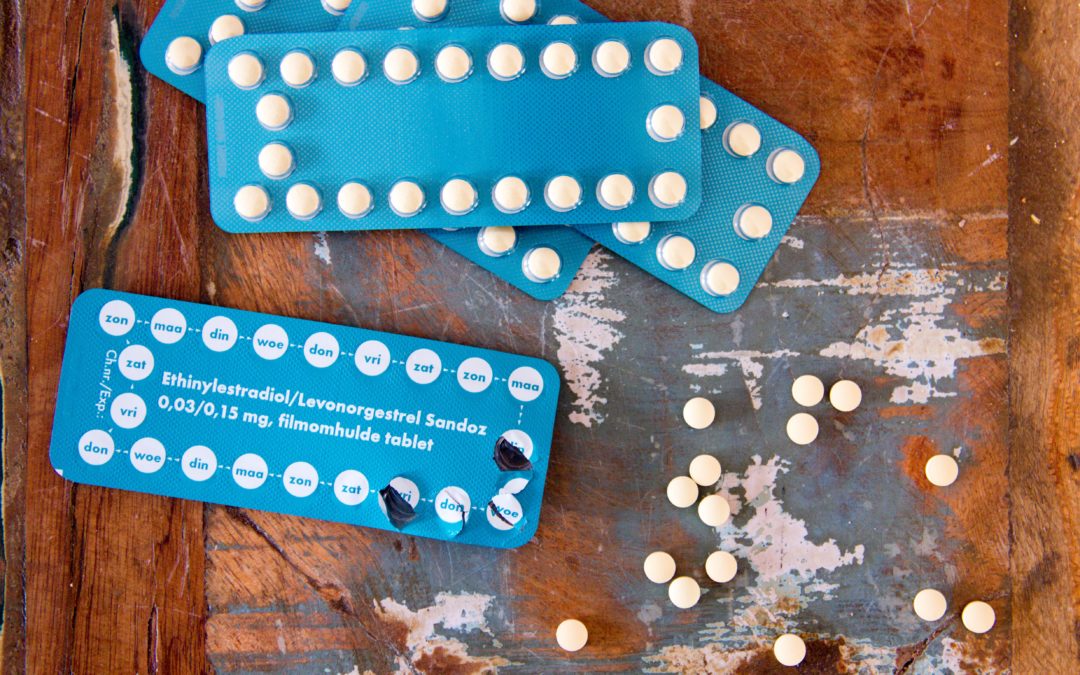As much as we would like to believe it since it is such a simple solution, birth control doesn’t “fix” endo. I can’t tell you how often I hear stories like these. A woman walks into her doctor’s office, tells them that she is experiencing pain, hormonal symptoms, irregular cycles, any number of things and walks out with a prescription for hormonal birth control.
In fact, that was me! I walked into a doctor’s office at age 20 with period pain and walked out with a shiny new prescription for birth control. I actually remained on that prescription for 7 full years until my husband and I decided we were ready to start a family. Kick the birth control and what happened? You guessed it, my symptoms came back…but with a vengeance!
What’s the deal with that?
Here’s the thing about birth control that many of us are never told. Hormonal birth control does NOT actually “regulate” your menstrual cycle. It stops it from happening altogether.
What?? So why do I still bleed then, you ask? That is actually not a true period, but actually what is called a withdrawal bleed. Most hormonal birth control is taken for three weeks and then given a one week break. When the medication is removed, your body experiences that withdrawal bleed.
Basically the synthetic hormones in birth control mimic your natural hormones, so it blocks receptor sites that your natural hormones would otherwise use.
Why are symptoms often worse when you quit birth control?
Another little-known fact about birth control is that it causes a lot of nutrient deficiencies. In fact, it is one of the medications out there that has been shown to cause some of the most deficiencies. These include Vitamin E, Vitamin C, B vitamins, magnesium, selenium, and zinc.
Now if you have been on birth control for any extended period of time, which most of us have, it is likely that you are low in many of these nutrients. Why does this matter? Because many of these nutrients are incredibly important for your endo body.
Magnesium, for example, helps smooth muscle to relax. This includes your uterus. Intense uterine cramps can be a sign that you are in need of magnesium. Vitamin E and C are vital antioxidants. These antioxidants help to reduce inflammation in your body, so without enough of these nutrients inflammation can run rampant.
Zinc is an important nutrient for the immune system, as many of us are familiar with when we supplement with it when feeling a cold coming on. Well, endo is at its root an immune dysfunction, so having plenty of zinc in your body is beyond important as well.
So why do I feel better when I am on birth control?
Well, birth control can help with symptom management. Remember how birth control shuts off your natural hormones and menstrual cycle? Well, given that many of your endo symptoms are related to your cycle, if you shut the whole system down it certainly can lead to improvement. At least until you stop taking the medication.
This is why I refer to birth control, or other hormone-blocking medications, as “band-aid solutions.” At the end of the day, birth control doesn’t “fix” endo. It just pushes the symptoms under the rug to deal with another day.
So what can I do instead?
I’m so glad you asked, because this is the part I am so very passionate about. There is a LOT you can do.
As I mentioned before, endo is at its root an immune dysfunction. There is also a strong inflammation component. Anyone who has experienced the pain and fatigue with endo is well aware of this!
So how can we help? Get to the root of the immune dysfunction and address the inflammation! 70% of the immune system resides in your gut, which is why I love to address gut health as a first line of defense with my clients. So many of us struggle with some degree of leaky gut, food sensitivities (even if they are hidden!), overgrowth of pathogens like bacteria, yeast, or even parasites.
If you struggle with bloating, bowel symptoms like constipation or loose stools, have undigested food in your stools, or even struggle with chronic fatigue or skin issues, this is definitely a place to look.
Why slap a band aid on when you can dig right to the root of the issue??
Cool! What can I do right now, today?
Start with flooding your body with nutrients. If you are currently on birth control, I would actually recommend flooding your body with nutrients first before you consider going off the pill. And of course consult with your doctor when making these decisions.
Load up your plate with plenty of fresh veggies and fruits, whole food sources of protein like organic pasture raised poultry and eggs, grass fed meat and dairy if tolerated, and wild caught seafood. Ditch the processed foods, sugar, alcohol, and vegetable oils which are highly inflammatory.
For some women, these types of changes may be enough! Others may need to look deeper into gut health and/or eventually having endo lesions removed with a skilled surgeon.
But what if I need birth control to prevent pregnancy?
This is a wonderful question and I wish I had a simple, foolproof answer for you. Why aren’t there more birth control options out there that do not completely block our natural hormones and deprive us from nutrients? While we’re at it, why aren’t there more forms of male birth control?
I hope that someday there will be more options on the market. As of right now today though, there are some options available that are not hormonal. There are barrier methods like condoms and diaphragms. There are non-hormonal birth control options like the copper IUD. Another option is methods like the Fertility Awareness Method where you learn to read your body’s fertile signs like basal body temperature and cervical mucus to determine when in your cycle you are fertile. Remember that a woman is actually only fertile for 5-6 days out of each cycle!
If birth control doesn’t fix endo, how to make the best decision for you
My purpose in writing this article is to show you that birth control doesn’t “fix” endo. I am by no means telling you that you shouldn’t use it. That is, at the end of the day, a choice for you and your doctor to make. But I do believe that women should be fully informed of what they are getting themselves into before starting any medication and unfortunately that is so often not the case.
If you do choose to use hormonal birth control, you are at least now armed with the knowledge of the nutrient deficiencies it causes so you can get a good idea of where you might need to supplement or focus on foods containing these nutrients.
Wherever your endo journey may lead you, know that I am sending you love and that you are not alone.
Much love!
Want to get a jumpstart on your nutrient-dense diet for endo? Click here to download your FREE Endo Reset 7 Day Meal Plan.
Ready to take the leap and finally get to the root cause of your endo symptoms? Click here to learn more about my 1:1 coaching program and apply today!
Other Articles You Might Enjoy:
The 5 WORST Foods for Endometriosis
The 5 BEST Foods for Endometriosis
3 Simple Ways to Reduce Endo Pain Naturally
References:
International Association for Functional Hormone Health. (2022). Functional Hormone Specialist Certification Program Module 3.1 and 3.3 Slides and Transcripts [PDF Documents].
Cooper, Danielle B., Patel, Preeti, Mahdy, Heba. (2022). Oral Contraceptive Pills. Retrieved from: https://www.ncbi.nlm.nih.gov/books/NBK430882/
Romm, Aviva. (2017). Pill: Are the Risks Too Bitter to Swallow? Retrieved from: https://avivaromm.com/the-pill-risks/
Palmery, M., Saraceno, A., Vaiarelli, A., Carlomagno, G. (2013). Oral contraceptives and changes in nutritional requirements. Retrieved from: https://pubmed.ncbi.nlm.nih.gov/23852908/
Weschler, Tony. (2015). Taking Charge of Your Fertility. New York, NY: HarperCollins Publishers.


